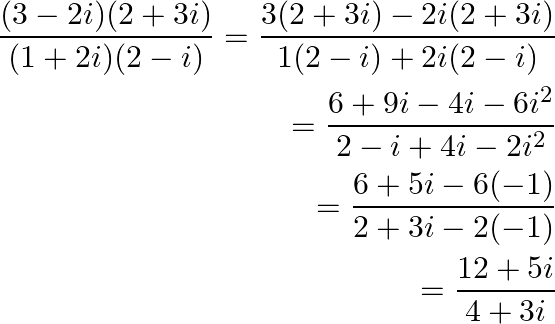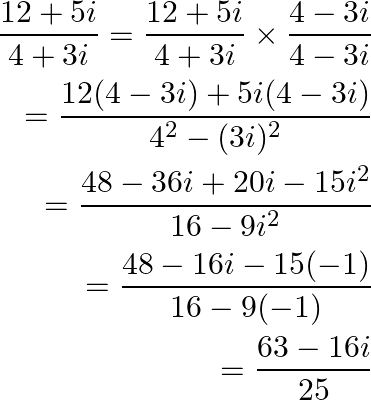Solution:
(i) ![]()
As the given complex no. is not in the standard form of ![]()
Convert it to standard form,
![Rendered by QuickLaTeX.com \begin{aligned} \frac{(1+i)(2+i)}{3+i} =\frac{1(2+i)+i(2+i)}{3+i} \\ =\frac{2+i+2 i+i^{2}}{3+i} \\ =\frac{2+3 i+(-1)}{3+i}\left[\text { Since, } i^{2}=-1\right] \\ =\frac{1+3 i}{3+i} \end{aligned}](https://www.learnatnoon.com/s/wp-content/ql-cache/quicklatex.com-4815ef39246b3b2acdbb3648e5896845_l3.png)
On multiplying and dividing it with ![]() we obtain,
we obtain,
![Rendered by QuickLaTeX.com \begin{aligned} \frac{1+3 i}{3+i} =\frac{1+3 i}{3+i} \times \frac{3-i}{3-i} \\ =\frac{1(3-i)+3 i(3-i)}{3^{2}-i^{2}} \\ =\frac{3-i+9 i-3 i^{2}}{9-(-1)}\left[\text { Since }, i^{2}=-1\right] \\ =\frac{3+8 i-3(-1)}{10} \\ =\frac{6+8 i}{10} \\ =\frac{3}{5}+\frac{4 i}{5} \end{aligned}](https://www.learnatnoon.com/s/wp-content/ql-cache/quicklatex.com-c9165a637be8790072f4530a19f1f279_l3.png)
It is known that the conjugate of a complex number ![]() is
is ![]()
As a result, the conjugate of ![]() is
is ![]()
(ii) ![]()
As the given complex no. is not in the standard form of ![]()
Convert it to standard form,

On multiplying and dividing with ![]() we obtain,
we obtain,

It is known that the conjugate of a complex number ![]() is
is ![]()
As a result, the conjugate of ![]() is
is ![]()
